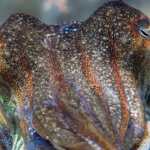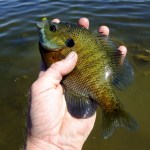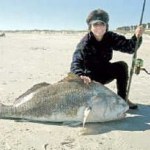fishing
Image of yellowfin tuna via Wikimedia Commons.
I love fishing. As with every fisherman, I have my fair share of "the one that got away" stories steeped in *mostly* truth. So, you can imagine my interest in reading research that shows fish appear to be shrinking in warming waters.
Warm waters carry less oxygen, which makes it difficult for fish to breath...especially larger fish. Metabolism is also higher in fish living in warm waters. Higher metabolism means the fish need more oxygen. The gills of fish are responsible for extracting oxygen from water and when they reach their maximum…
Last June (and May and July and part of August) we had a lot of precipitation in Minnesota. This caused lake levels to rise modestly. One lake, which is large enough to have meaningful waves, has older settlement along it so lots of cabins, boat houses, and such are right on the shoreline. With the lake level up, waves threatened the material possessions of rich white people, so naturally something had to be done. A No-Wake Rule was put into effect.
A No-Wake Rule means the oversized fishing boats and smallish cabin cruisers that normally ply this large exurban lake need to all go at 5 m…
This is funny:
Just so you know, he was not fishing for "bluegills" This is a bluegill:
A nice bluegill
Bluegills live in fresh water and are like "sunfish" and "pumpkinseeds" and "crappies" etc. all of which are in the bass family.
Bluefish live in the ocean and roam along littoral regions in large schools. This is what large bluefish look like:
Of course, when one is fishing for bluefish, there is always the possibility of catching the fish that eats them, such as striped bass. Like this:
The striped bass is not in the "bass family" referred to above. Striped Bass are Moronidae,…
My absolute favorite kinds of presentations to give (even though they are by far the most work) are the one's I've been doing increasingly often, giving analyses of regional food security.
I focus on both present and prospective food issues in a lower energy, less economically stable and warmer future. in them I set out both the historical crops and food source of the region, and what is currently produced there, and explore what steps a community or a bioregion might take to enhance their food security. I examine underutilized resources, and what else might be brought into play. I…
Today, I took out the trash. I may or may not have taken the trash out last week, but I can tell you that the last time I did take it out, whenever it was, I had to drag the trash barrel across ice. Yesterday I went to the gym without a coat or jacket. That made me have to decide if I wanted to go to the locker room to stow the contents of my pockets (car keys, etc.) or just keep those things in my pocket. The grass outside is green. We expect snow on Friday.
Where I grew up, in what is now known among gardeners and cooperative extension agents as Zone 5b (though a short drive from a…
Apropos a discussion on Jaf's facebook page regarding the efficacy of leaving one's car window open while driving on the lake-ice (to escape in the event the ice breaks), I decided I needed one of these Emergency Hammers, just in case. Little did I realize that this versatile tool can also be used to order Chicken MgNuggets at McDonalds, even during the Breakfast Menu Blackout Period:
Hat Tip: Andrew
There are two lies you will hear from anyone who is into the sport of angling. 1) "It was THIS BIG!" and 2) "Catching fish isn't the point. It's the experience of fishing that matters."
The Mocking Bass. For four years this fish watched me cast lures and live bait from the end of the small dilapidated dock in the lagoon behind the cabin, without ever showing interest in what I had to offer. Two weeks ago I dropped a plastic worm on his head. The worm slid off and rested on the bottom. The mocking bass reoriented towards the worm and took a sniff. I jiggled the worm. And, BANG. He…
Helping out a threatened predator by culling their prey seems like a really stupid idea. But Scandinavian scientists have found that it might be the best strategy for helping some of our ailing fish stocks.
Lennart Persson and colleagues from Umeå University came up with this counterintuitive concept by running a 26-year natural experiment with the fish of Lake Takvatn, Norway. At the turn of the 20th century, the top predator in Lake Takvatn was the brown trout. Over-fishing sent its numbers crashing, and it was virtually gone by 1980.
In its place, a smaller fish - the Arctic char Â-…
On the 3rd of October, 2006, Nicolas Makris watched a quarter of a billion fish gather in the same place. They were Atlantic herring, one of the most abundant fishes in the ocean and one prone to gathering in massive schools. This was the first time that anyone had watched the full scope of the event, much less capture it on video.
The first signs of the amassing herring appeared around 5pm and by sunset, the gathering had begun in earnest. Once a critical level of fish was reached, the shoal expanded at a breakneck pace, suddenly growing to cover tens of kilometres within the hour. By…
Earlier this year, I wrote about how the human obsession with size is reshaping the bodies of other species at an incredible pace. Unlike natural predators that cull the sick, weak and unfit, human fishermen prize the biggest catches and throw the smallest ones back in.
As a result, fish and other species harvested by humans are shrinking, often within a few generations, and are becoming sexually mature at an earlier stage. These changes are bad news for populations as a whole, for smaller individuals often have lower odds of survival and produce fewer offspring.
But David Conover from…
In the Goualougo Triangle of the Republic of Congo, a chimpanzee is hungry for termites. Its prey lives within fortress-like nests, but the chimp knows how to infiltrate these. It plucks the stem from a nearby arrowroot plant and clips any leaves away with its teeth, leaving behind a trimmed, flexible stick that it uses to "fish" for termites.
Many chimps throughout Africa have learned to build these fishing-sticks. They insert them into termite nests as bait, and pull out any soldier termites that bite onto it. But the Goualougo chimps do something special. They deliberately fray the ends…
In the middle of the Pacific Ocean, Gonzalo Mucientes has discovered an invisible line in the sea that separates male mako sharks from females. The line runs from north to south with the Pitcairn Islands to its west and Easter Island to its east. On the western side, a fisherman that snags a mako will most probably have caught a male. Travel 10 degrees of longitude east and odds are they'd catch a female. This is a shark that takes segregation of the sexes to new heights.
Mucientes and colleagues from Spain, Portugal and the UK spent four months aboard a Spanish longline fishing vessel.…
I had occasion this week to tell friends the story of my maternal grandmother. She was born in 1906 in an eastern Pennsylvania coal mining town. Her family was so poor that she was sent at age 16 to northern New Jersey to clean houses for wealthy families. She gave me pictures of her from the late 1940s as the only woman in a machine shop and, later, continued to shop for her own groceries three-quarters of a mile away well into her late 80s. Although she drove my mother crazy (my Mom is a fantastic story of achievement for another day), I suspect that grandma had undiagnosed obsessive-…
tags: Charles Darwin, nature, evolution, streaming video
This video "has stunned scientists around the world" (really?) as this bird thinks critically, just like a human, to catch fish. Give this bird a piece of bread and watch it use it as fish bait [1:17]
Okay, a special question for all my mystery birds fans: can you name this species? What field marks led you to this identification? Oh, and have any of you ever seen something like this?
As a species, our unflinching obsession with size is just as apparent in our dealings with other animals as it is in our personal lives. Fishermen prize the biggest catches and they're are obliged to throw the smallest specimens back in. Hunters also value the biggest kills; they provide the most food and make the flashiest trophies. This fixation isn't just a harmless one - by acting as a size-obsessed super-predator, humans are reshaping the bodies of the species we hunt, at a remarkable pace and to a dramatic degree.
Predators already put a lot of pressure on their prey to evolve new ways…
On the surface, plummeting populations of sharks do not seem like much cause for concern for humans or, for that matter, other sea life. But this simple viewpoint relies on splitting animals into two groups - predators and prey. In practice, this distinction is far too crude. Too put it bluntly, there are predators and there are predators. Those at the top kill those in the middle, and stop them in turn, from killing those at the bottom. As the old saying goes, the enemy of my enemy is my friend.
The rise in shark fishing is mainly driven by a growing market for their fins. Shark fins soup…
A very good day of grunting worms. Credit: Ken Catania So-called Gene-Culture Co-Evolution can be very obvious and direct or it can be very subtle and complex. In almost all cases, the details defy the usual presumptions people make about the utility of culture, the nature of human-managed knowledge, race, and technology. I would like to examine two cases of gene-culture interaction: One of the earliest post-Darwinian Synthesis examples addressing malaria and sickle-cell disease, and the most recently published example, the worm-grunters of Florida, which it turns out is best…
The next time you buy salmon from your local supermarket, think about the hidden costs in each succulent fillet. Compared to wild fish, farmed salmon is far less likely to burden your wallet. But by buying it, you may be placing a much larger burden on the environment. Fish stocks around the world are declining due to over-fishing and 'aquaculture' - the farming of fish - was originally thought to help. But farming brings with it a host of ecological problems.
If the farmed fish are meat-eaters, as salmon are, they must be fed on the proteins and oils of wild fish, which does nothing to…
A complete ban on fishing can save coral reef communities in more ways than one. A few weeks ago, I blogged about a study which found that the coral trout, a victim of severe overfishing, was bouncing back in the small regions of the Great Barrier Reef where fishing has been totally forbidden. It certainly makes sense that fish will rebound when fishing ceases, but a new study reveals that the bans have had more indirect benefits - they have protected the corals from a predatory starfish.
The crown-of-thorns starfish (Acanthaster planci) is a voracious hunter of corals and a massive problem…
In 2004, the Australian Government turned a third of the Great Barrier Reef into the largest network of no-fishing zones in the world. All fishing was banned in an area of sea just smaller than England. It was a bold and controversial political move - jobs and livelihoods, it was said, were on the line. But the plan went ahead and in just a few years, there are signs that it's working. One of the reef's most heavily fished species - the coral trout- is enjoying a dramatic comeback, thanks to this most ambitious of marine conservation projects.
The vast expanse of the Great Barrier Reef is…


